Don’t Miss Out On This Unique Astrological Opportunity
Are you tired of spinning your wheels and getting nowhere? Simply put, you’re out of sync: you’re out of alignment with your astral configuration.
But: there’s a kind of map that can help you reclaim your alignment. Think of it as your own personal blueprint to success and happiness: a blueprint that will help you live your most amazing life.
Get started here.
Christianity has played a vital role in shaping various events that have impacted society, culture, and politics.
From the rise of powerful empires to social reforms, Christianity’s teachings and values have left a lasting mark.
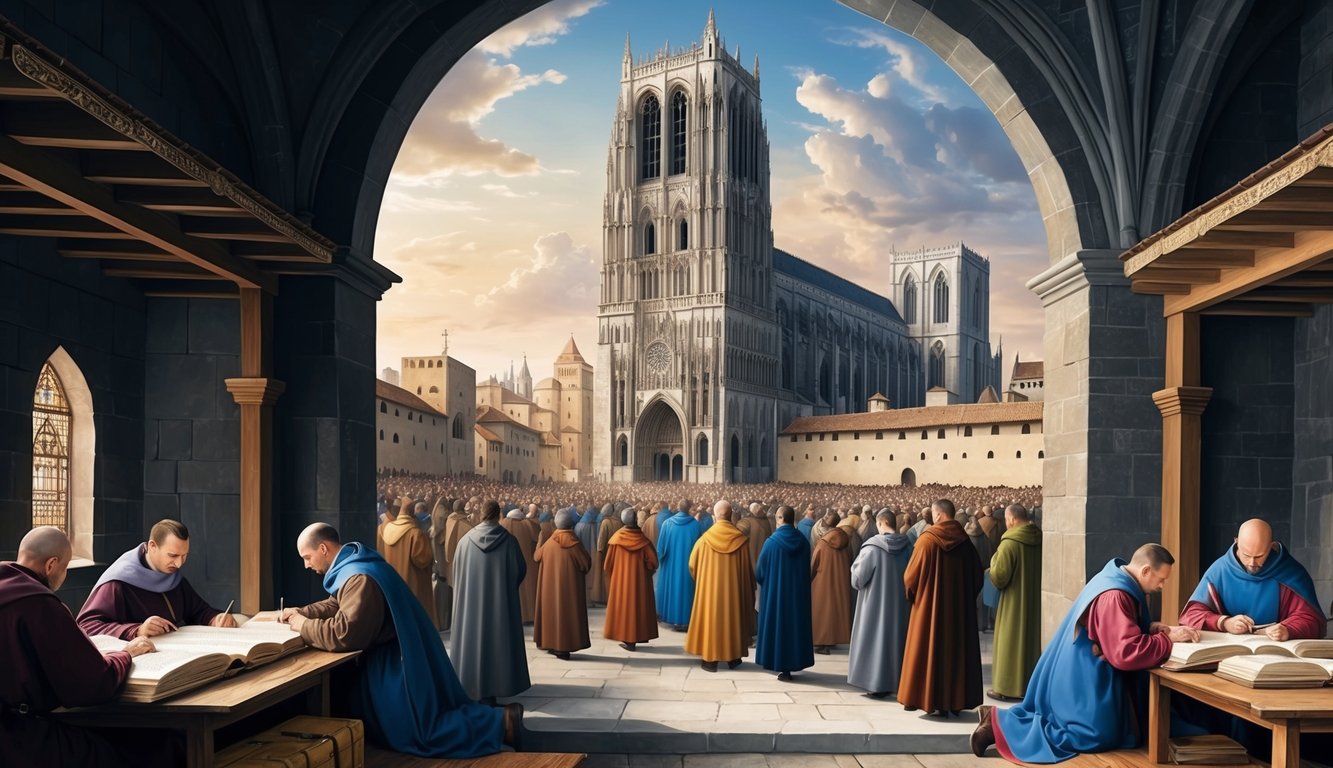
Understanding these connections can help you appreciate the powerful legacy of Christianity.
As you explore these significant events, you’ll see how the actions of individuals and communities within the faith have transformed the world in many ways.
Each moment offers insight into how belief can inspire change and guide nations.
1) Edict of Milan
The Edict of Milan was a significant event in 313 CE.
It was a proclamation that allowed Christians to practice their faith openly within the Roman Empire.
Emperors Constantine I and Licinius agreed to this decree in Milan.
This agreement marked a major shift in how Christians were treated.
Previously, many faced persecution simply for their beliefs.
With the Edict, Christians could worship without fear.
It also stated that any church property taken from Christians should be returned.
This restoration helped rebuild the early church.
The Edict of Milan improved the relationship between Christianity and the Roman government.
It played a key role in the spread of the religion throughout the empire.
Today, the Edict serves as a reminder of the importance of religious freedom.
It showed how a change in laws can promote acceptance and understanding among different faiths.
Council of Nicaea
The Council of Nicaea took place in 325 AD.
It was the first major meeting of church leaders from across the Roman Empire.
Emperor Constantine called this council to promote unity among Christians.
One key issue discussed was Arianism, a belief that questioned the nature of Jesus Christ.
The council aimed to address these differing views and establish a common faith.
It also produced the Nicene Creed, which outlines core Christian beliefs.
This creed is still important in many Christian denominations today, including Roman Catholic and Protestant churches.
The council helped to shape Christianity by creating standards for belief.
It set the stage for how church leadership would be organized and recognized.
By bringing together leaders to discuss and settle these issues, the Council of Nicaea significantly influenced the development of Christian doctrine.
3) The Great Schism
The Great Schism of 1054 was a key moment in Christian history.
It marked the split between the Eastern Orthodox Church and the Roman Catholic Church.
Before this, there was a united Church, but differences had been growing for years.
Cultural and theological differences set the stage for this split.
The Eastern Church, led by the patriarch of Constantinople, and the Western Church, led by the Pope, had different practices and beliefs.
One major issue was the authority of the Pope.
Many in the East felt that the Pope had too much power.
This disagreement led to mutual excommunications, which sealed the divide.
The Great Schism had a lasting impact on Christianity.
It shaped not only religious practices but also influenced politics and cultures in Europe and beyond.
Churches continued to develop separately, forming distinct identities that resonate today.
Understanding the Great Schism helps you see how this split still affects Christian communities around the world.
4) Spanish Inquisition
The Spanish Inquisition began in 1478, started by King Ferdinand II and Queen Isabella I. Its goal was to maintain Catholic beliefs in Spain after the Reconquista.
People suspected of not being true Catholics faced severe scrutiny.
Many were accused of heresy, leading to trials that often used torture.
Those found guilty faced harsh punishments, including imprisonment or even execution.
Fear of persecution led many to publicly affirm their faith, even if they had doubts in private.
Much like some Christian celebrities who left Hollywood due to personal convictions, individuals in this era sometimes chose exile over compromising their beliefs.
Inquisitors operated in secrecy, making it hard for the accused to defend themselves.
The lack of fair trials created a climate of fear.
This period affected many lives and families.
Many Jewish people converted to avoid persecution, but their faith was still questioned.
The Inquisition is a significant moment in history.
It shows the mix of faith and power during that time.
5) Protestant Reformation
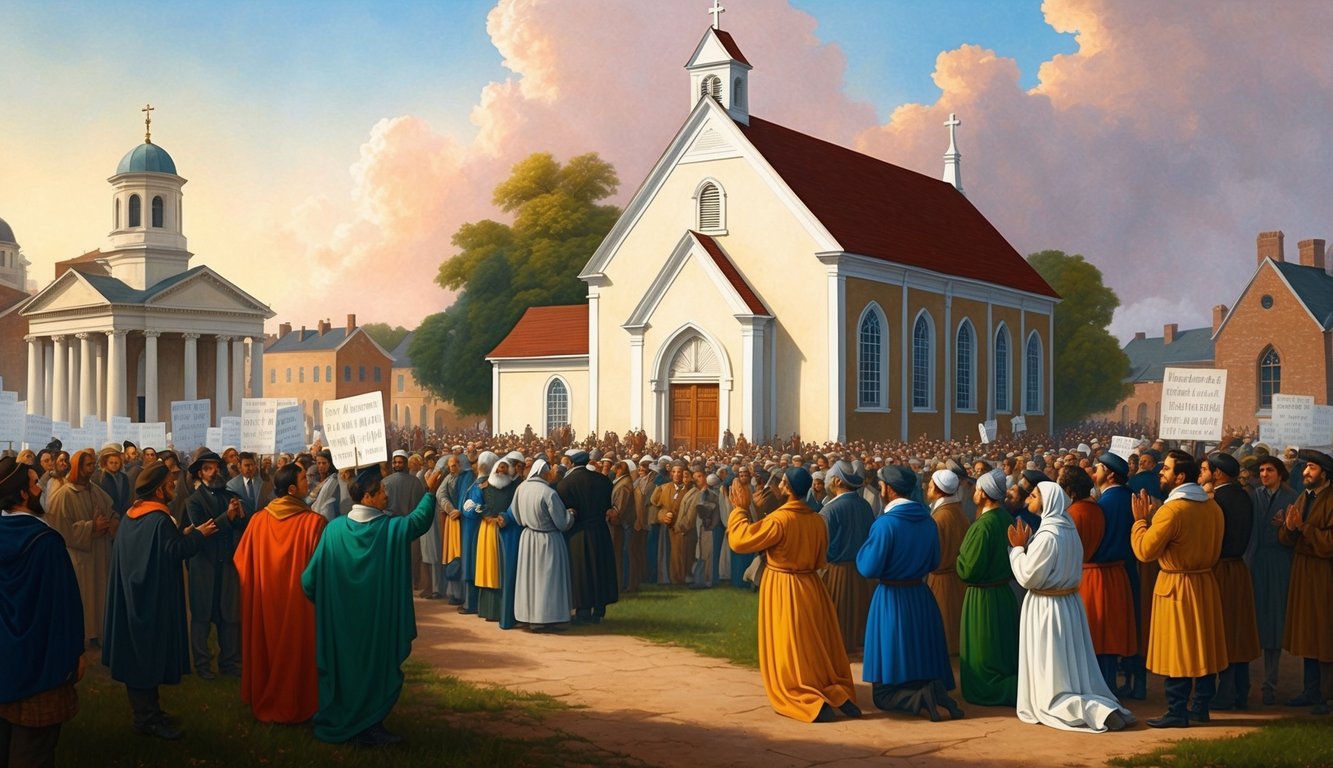
The Protestant Reformation was a crucial time in Christian history during the 16th century.
It began with Martin Luther’s 95 Theses in 1517, which challenged the practices of the Catholic Church.
You may know that the Reformation led to the creation of several new Christian denominations.
People no longer felt they had to follow the Pope exclusively.
This shift allowed for more personal interpretations of the Bible.
John Calvin was another key figure.
His teachings influenced many areas of life, including politics and society.
The idea of individual faith became more important.
The Reformation also changed how people viewed authority.
It sparked discussions about governance that helped shape modern nation-states.
This period not only affected religion, but it also had significant cultural impacts.
As the Reformation spread across Europe, it shaped communities and created a lasting legacy.
Today, its effects can still be seen in many Christian practices and beliefs.
The Protestant Reformation truly reshaped the landscape of Christianity and all of Western society.
6) English Reformation

The English Reformation was a significant time in the 16th century when the Church of England broke away from the Catholic Church.
This change started under King Henry VIII, who wanted an annulment that the Pope refused to grant.
As a result, the English monarch became the head of the new Protestant Church of England.
This shift changed how people practiced Christianity in England.
The Reformation led to the dissolution of monasteries, impacting society and culture.
Many people began to explore new ideas about faith and worship.
You can see how this movement shaped modern Christianity in England.
It also set off a wave of religious conflicts in the years that followed, as different groups argued about beliefs and practices.
The English Reformation was not just about religion; it influenced politics, society, and the lives of everyday people.
7) Treaty of Westphalia
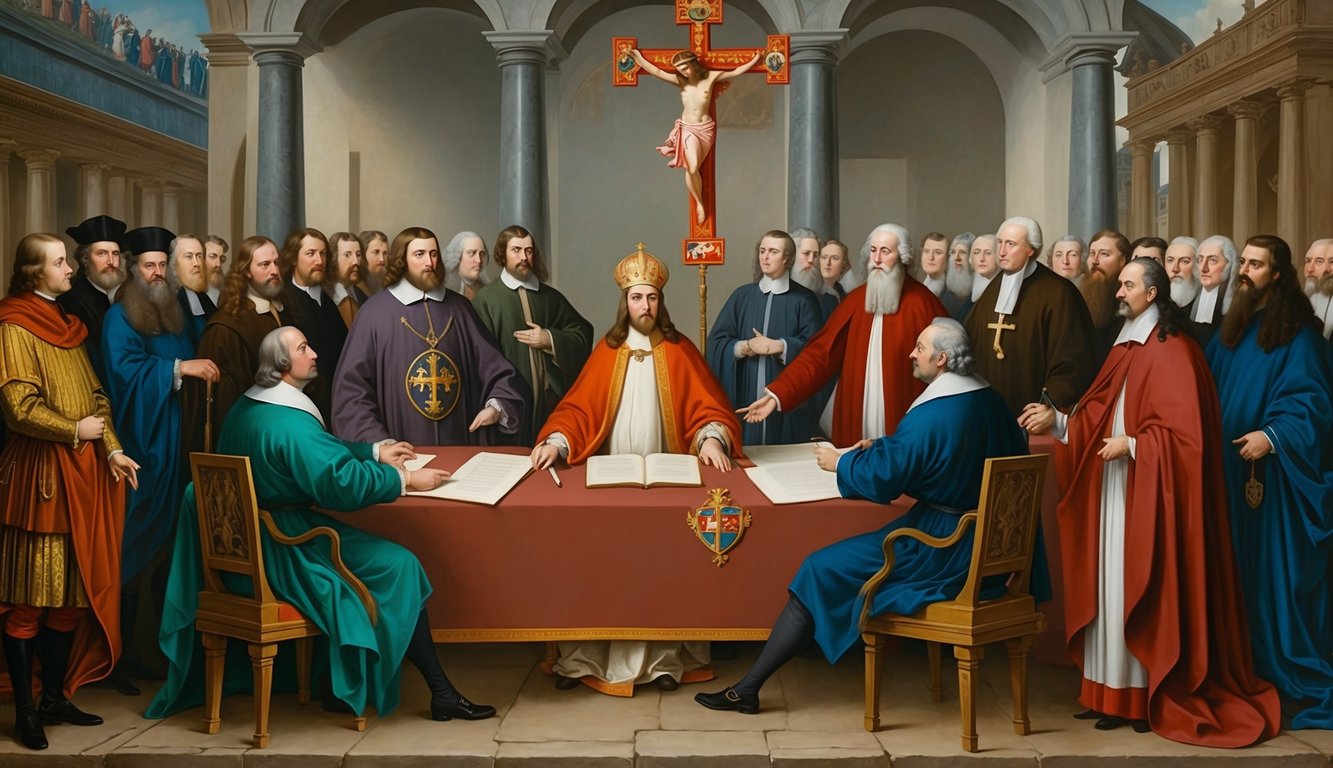
The Treaty of Westphalia, signed in October 1648, was a significant turning point in European history.
It ended the Thirty Years’ War, a conflict that deeply affected many nations, particularly in the Holy Roman Empire.
You may find it interesting that this war involved various religious groups, primarily Catholics and Protestants.
The peace treaties aimed to bring stability to a region shattered by intense religious strife.
By recognizing the independence of the Dutch Republic and establishing new political boundaries, the treaty changed the landscape of Europe.
It also introduced the principle of state sovereignty, making countries less likely to interfere in each other’s internal affairs.
This shift affected how Christians related to one another across borders.
Instead of constant warfare, there was a new focus on diplomacy and coexistence among different religious groups.
The Treaty of Westphalia laid the groundwork for modern international relations and showed how faith can shape the course of events.
8) First Crusade
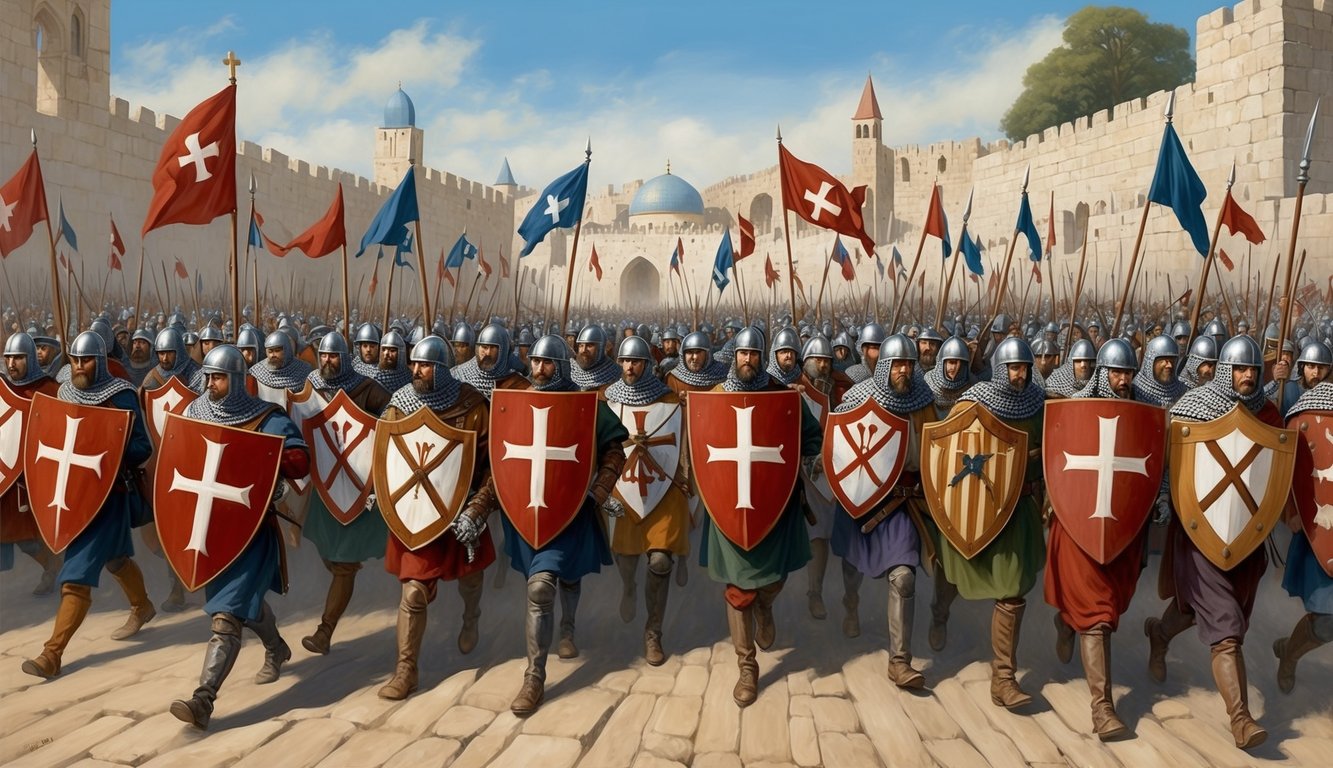
The First Crusade started in 1096 and aimed to capture Jerusalem from Muslim control.
It was inspired by Pope Urban II, who called for the campaign to help the Byzantine Empire and reclaim holy sites.
You may be surprised to learn that about 60,000 soldiers joined this effort.
The Crusaders faced many challenges on their journey but eventually reached Jerusalem.
After a long siege, they captured the city in July 1099.
This victory had lasting impacts on Christian-Muslim relations and shaped world history.
The Crusade opened a door to further conflicts between the two groups.
It also encouraged more people to take part in future Crusades, leading to multiple military campaigns over the centuries.
The First Crusade is significant because it united various European factions under a common cause.
This event marked a major moment in Christian history and influenced the way faith was expressed in Europe.
The Role of Christianity in the Roman Empire
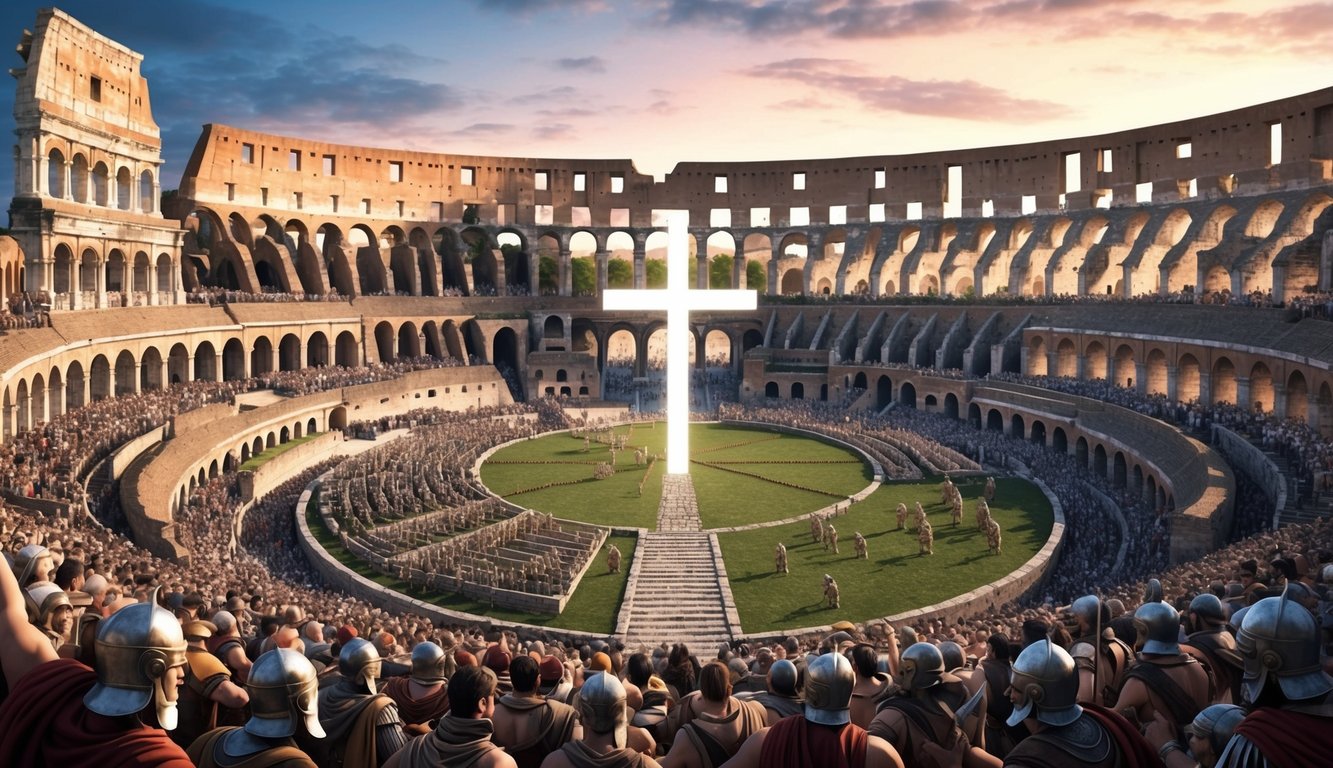
Christianity played a vital role in shaping the Roman Empire, impacting its political and social structures.
Key events like the conversion of Emperor Constantine and the issuance of the Edict of Milan transformed the way Christians practiced their faith and integrated into society.
Conversion of Constantine
Emperor Constantine’s conversion to Christianity around 312 AD was a turning point for the faith.
After a vision before the Battle of Milvian Bridge, he claimed divine support, leading to his victory.
This event marked the start of a shift in the empire’s attitude toward Christians.
Constantine’s support for Christianity changed everything.
He began to favor the faith, granting privileges to Christians and giving them power in society.
His actions set the stage for Christianity to flourish, moving from a persecuted religion to one that received imperial support.
Edict of Milan and Religious Freedom
In 313 AD, the Edict of Milan was issued, granting freedom of worship to all religions across the Roman Empire.
This decree ended years of persecution against Christians and allowed them to practice their faith openly.
The Edict not only supported Christianity but also reflected a broader change in the empire’s approach to religion.
With this legal backing, Christians could build churches and spread their beliefs without fear.
This led to rapid growth in the number of followers and deeper integration of Christian values within Roman culture.
Christianity and the Middle Ages

During the Middle Ages, Christianity played a vital role in shaping various aspects of life, from education to art.
This period saw significant developments in thought and culture influenced by the Church.
Development of Scholasticism
Scholasticism emerged in the medieval period as a method of learning that sought to unify faith and reason.
It developed within monasteries and later in universities, which were often founded by the Church.
Key figures like Thomas Aquinas used logic to explain theological concepts.
This approach allowed for discussions about faith using reason.
Students learned to analyze texts deeply, questioning assumptions and drawing conclusions.
This helped lay the groundwork for modern Western education.
Influence on Medieval Art and Architecture
Christianity profoundly influenced art and architecture in the Middle Ages.
Churches became central to communities, and their designs reflected religious beliefs.
Gothic architecture, with its tall structures and stained glass windows, aimed to inspire awe and convey divine beauty.
These features told biblical stories, making faith accessible to all.
Artists like Giotto created works that emphasized human emotion, making religious scenes relatable.
Such art not only served worship but also educated the public about biblical events and principles.
Frequently Asked Questions

When considering the impact of Christianity on history, several key moments and concepts emerge.
These shed light on how Christian beliefs and practices have shaped events over the centuries.
What are the pivotal moments in the founding of Christianity?
Important moments in Christianity’s founding include the life and teachings of Jesus Christ, his crucifixion, and the spread of his teachings by his apostles.
The Edict of Milan in 313 AD played a crucial role in legalizing Christianity in the Roman Empire.
How has Christianity shaped modern society’s values and ethics?
Christianity has influenced modern values such as compassion, love for others, and the idea of justice.
These concepts can often be traced back to biblical teachings, which emphasize the importance of community and caring for those in need.
Which significant events in history were directly influenced by Christian beliefs?
Events like the Council of Nicaea established key Christian doctrines such as the nature of Christ.
The Spanish Inquisition reflects the historical impact of Christianity on politics and culture, where religious beliefs directly influenced governance and law.
Can you list key events that demonstrate Christianity’s impact on global history?
Several key events include the Protestant Reformation, which reshaped Christianity into different denominations.
The Great Schism also marked a significant division within the Church, affecting millions of believers worldwide.
How did Christianity’s development contribute to the shaping of Western civilization?
Christianity influenced art, education, and law in Western civilization.
Monasteries were centers for learning and preservation of texts, while Christian doctrine informed legal systems and ethical standards.
In what ways has Christianity played a role in major political and social revolutions?
Christianity played a role in various movements, such as the abolition of slavery.
Leaders in the Civil Rights Movement drew on Christian teachings to advocate for equality and justice.
They highlighted the faith’s continuing relevance in social issues.



